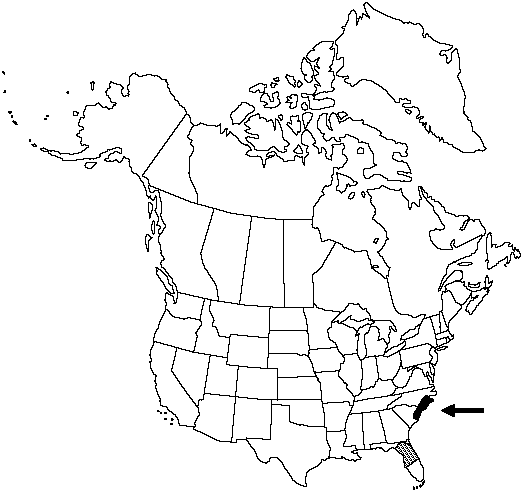Difference between revisions of "Asplenium ×heteroresiliens"
Amer. Fern J. 56: 12, plate 3. 1966.
FNA>Volume Importer |
GeoffLevin (talk | contribs) m (Corrected authority to match printed version) |
||
| (8 intermediate revisions by 2 users not shown) | |||
| Line 1: | Line 1: | ||
{{Treatment/ID | {{Treatment/ID | ||
|accepted_name=Asplenium ×heteroresiliens | |accepted_name=Asplenium ×heteroresiliens | ||
| − | |accepted_authority=W. | + | |accepted_authority=W. H. Wagner |
|publications={{Treatment/Publication | |publications={{Treatment/Publication | ||
|title=Amer. Fern J. | |title=Amer. Fern J. | ||
| Line 17: | Line 17: | ||
}}<!-- | }}<!-- | ||
| − | --><span class="statement" id="st- | + | --><span class="statement" id="st-undefined" data-properties=""><b>Roots </b>not proliferous. <b>Stems</b> erect, rarely branched; scales black throughout, linear-lanceolate, 1–3.5 × 0.1–0.4 mm, margins entire. <b>Leaves</b> monomorphic. <b>Petiole</b> black or purplish black throughout, lustrous, 1–2 cm, 1/5–1/10 length of blade; indument of black filiform scales at base. <b>Blade</b> linear to narrowly oblanceolate, 1-pinnate throughout, 5–15 × 1–2 cm, thick, glabrous; base gradually tapered, apex acute, not rooting. <b>Rachis</b> black or purplish black throughout, lustrous, glabrous or with a few scattered scales. <b>Pinnae</b> in 12–30 pairs, oblong to quadrangular; medial pinnae 5–10 × 2–3 mm; base with slight or prominent acroscopic auricle and often with basiscopic auricle; margins usually shallowly crenulate, rarely ± entire; apex acute to obtuse. <b>Veins</b> free, obscure. <b>Sori</b> 1–5 pairs per pinna, on both basiscopic and acroscopic sides. <b>Spores</b> 32 per sporangium. n = 2n = 180 (apogamous).</span><!-- |
-->{{Treatment/Body | -->{{Treatment/Body | ||
| Line 23: | Line 23: | ||
|elevation=0–100 m | |elevation=0–100 m | ||
|distribution=Fla.;N.C.;S.C. | |distribution=Fla.;N.C.;S.C. | ||
| − | |discussion=<p>V. M. Morzenti (1966) studied the cytology and morphology of Asplenium × heteroresiliens and found it to be a pentaploid (5 x) of hybrid origin between A. resiliens (3 x) and A. heterochroum (4 x). The hybrid is intermediate in morphology between the parents, and it is difficult to separate from them. Misshapen spores mixed with large globose spores can usually be found on the same specimen.</p> | + | |discussion=<p>V. M. Morzenti (1966) studied the cytology and morphology of <i>Asplenium</i> × <i>heteroresiliens</i> and found it to be a pentaploid (5 x) of hybrid origin between <i>A. resiliens</i> (3 x) and <i>A. heterochroum</i> (4 x). The hybrid is intermediate in morphology between the parents, and it is difficult to separate from them. Misshapen spores mixed with large globose spores can usually be found on the same specimen.</p> |
|tables= | |tables= | ||
|references= | |references= | ||
| Line 32: | Line 32: | ||
-->{{#Taxon: | -->{{#Taxon: | ||
name=Asplenium ×heteroresiliens | name=Asplenium ×heteroresiliens | ||
| − | + | |authority=W. H. Wagner | |
| − | |authority=W. | ||
|rank=species | |rank=species | ||
|parent rank=genus | |parent rank=genus | ||
| Line 46: | Line 45: | ||
|publication year=1966 | |publication year=1966 | ||
|special status= | |special status= | ||
| − | |source xml=https:// | + | |source xml=https://bitbucket.org/aafc-mbb/fna-data-curation/src/2e0870ddd59836b60bcf96646a41e87ea5a5943a/coarse_grained_fna_xml/V2/V2_11.xml |
|genus=Asplenium | |genus=Asplenium | ||
|species=Asplenium ×heteroresiliens | |species=Asplenium ×heteroresiliens | ||
| − | |||
| − | |||
| − | |||
| − | |||
| − | |||
| − | |||
| − | |||
| − | |||
| − | |||
| − | |||
| − | |||
| − | |||
| − | |||
| − | |||
| − | |||
| − | |||
| − | |||
| − | |||
| − | |||
| − | |||
| − | |||
| − | |||
| − | |||
| − | |||
| − | |||
| − | |||
| − | |||
| − | |||
| − | |||
| − | |||
| − | |||
| − | |||
| − | |||
| − | |||
| − | |||
| − | |||
| − | |||
| − | |||
| − | |||
}}<!-- | }}<!-- | ||
-->[[Category:Treatment]][[Category:Asplenium]] | -->[[Category:Treatment]][[Category:Asplenium]] | ||
Latest revision as of 15:04, 9 December 2021
Roots not proliferous. Stems erect, rarely branched; scales black throughout, linear-lanceolate, 1–3.5 × 0.1–0.4 mm, margins entire. Leaves monomorphic. Petiole black or purplish black throughout, lustrous, 1–2 cm, 1/5–1/10 length of blade; indument of black filiform scales at base. Blade linear to narrowly oblanceolate, 1-pinnate throughout, 5–15 × 1–2 cm, thick, glabrous; base gradually tapered, apex acute, not rooting. Rachis black or purplish black throughout, lustrous, glabrous or with a few scattered scales. Pinnae in 12–30 pairs, oblong to quadrangular; medial pinnae 5–10 × 2–3 mm; base with slight or prominent acroscopic auricle and often with basiscopic auricle; margins usually shallowly crenulate, rarely ± entire; apex acute to obtuse. Veins free, obscure. Sori 1–5 pairs per pinna, on both basiscopic and acroscopic sides. Spores 32 per sporangium. n = 2n = 180 (apogamous).
Habitat: Limestone rocks
Elevation: 0–100 m
Distribution

Fla., N.C., S.C.
Discussion
V. M. Morzenti (1966) studied the cytology and morphology of Asplenium × heteroresiliens and found it to be a pentaploid (5 x) of hybrid origin between A. resiliens (3 x) and A. heterochroum (4 x). The hybrid is intermediate in morphology between the parents, and it is difficult to separate from them. Misshapen spores mixed with large globose spores can usually be found on the same specimen.
Selected References
None.